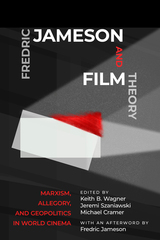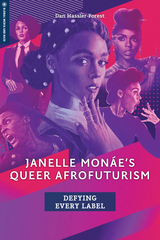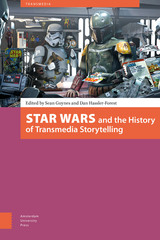3 books by Hassler-Forest, Dan

Fredric Jameson and Film Theory
Marxism, Allegory, and Geopolitics in World Cinema
Keith B. Wagner
Rutgers University Press, 2022
Frederic Jameson and Film Theory is the first collection of its kind, it assesses and critically responds to Fredric Jameson’s remarkable contribution to film theory. The essays assembled explore key Jamesonian concepts—such as totality, national allegory, geopolitics, globalization, representation, and pastiche—and his historical schema of realism, modernism, and postmodernism, considering, in both cases, how these can be applied, revised, expanded and challenged within film studies. Featuring essays by leading and emerging voices in the field, the volume probes the contours and complexities of neoliberal capitalism across the globe and explores world cinema's situation within these forces by deploying and adapting Jamesonian concepts, and placing them in dialogue with other theoretical paradigms. The result is an innovative and rigorously analytical effort that offers a range of Marxist-inspired approaches towards cinemas from Asia, Latin America, Europe, and North America in the spirit of Jameson's famous rallying cry: 'always historicize!'.
[more]

Janelle Monáe's Queer Afrofuturism
Defying Every Label
Dan Hassler-Forest
Rutgers University Press, 2022
Singer. Dancer. Movie star. Activist. Queer icon. Afrofuturist. Working class heroine. Time traveler. Prophet. Feminist. Android. Dirty Computer.
Janelle Monáe is all these things and more, making her one of the most fascinating artists to emerge in the twenty-first century. This provocative new study explores how Monáe’s work has connected different media platforms to strengthen and enhance new movements in art, theory, and politics. It considers not only Monáe’s groundbreaking albums The ArchAndroid, The Electric Lady, and Dirty Computer, but also Monáe’s work as an actress in such films as Hidden Figures and Antebellum, as well as her soundtrack appearances in socially-engaged projects ranging from I May Destroy You to Us. Examining Monáe as a cultural icon whose work is profoundly intersectional, this book maps how she is actively reshaping discourses around race, gender, sexuality, and capitalism. Tracing Monáe’s performances of joy, desire, pain, and hope across a wide range of media forms, it shows how she imagines Afrofuturist, posthumanist, and postcapitalist utopias, while remaining grounded in the realities of being a Black woman in a white-dominated industry. This is an exciting introduction to an audacious innovator whose work offers us fresh ways to talk about identity, desire, and power.
Janelle Monáe is all these things and more, making her one of the most fascinating artists to emerge in the twenty-first century. This provocative new study explores how Monáe’s work has connected different media platforms to strengthen and enhance new movements in art, theory, and politics. It considers not only Monáe’s groundbreaking albums The ArchAndroid, The Electric Lady, and Dirty Computer, but also Monáe’s work as an actress in such films as Hidden Figures and Antebellum, as well as her soundtrack appearances in socially-engaged projects ranging from I May Destroy You to Us. Examining Monáe as a cultural icon whose work is profoundly intersectional, this book maps how she is actively reshaping discourses around race, gender, sexuality, and capitalism. Tracing Monáe’s performances of joy, desire, pain, and hope across a wide range of media forms, it shows how she imagines Afrofuturist, posthumanist, and postcapitalist utopias, while remaining grounded in the realities of being a Black woman in a white-dominated industry. This is an exciting introduction to an audacious innovator whose work offers us fresh ways to talk about identity, desire, and power.
[more]

Star Wars and the History of Transmedia Storytelling
Edited by Sean Guynes and Dan Hassler-Forest
Amsterdam University Press, 2018
Star Wars has reached more than three generations of casual and hardcore fans alike, and as a result many of the producers of franchised Star Wars texts (films, television, comics, novels, games, and more) over the past four decades have been fans-turned-creators. Yet despite its dominant cultural and industrial positions, Star Wars has rarely been the topic of sustained critical work. Star Wars and the History of Transmedia Storytelling offers a corrective to this oversight by curating essays from a wide range of interdisciplinary scholars in order to bring Star Wars and its transmedia narratives more fully into the fold of media and cultural studies. The collection places Star Wars at the center of those studies’ projects by examining video games, novels and novelizations, comics, advertising practices, television shows, franchising models, aesthetic and economic decisions, fandom and cultural responses, and other aspects of Star Wars and its world-building in their multiple contexts of production, distribution, and reception. In emphasizing that Star Wars is both a media franchise and a transmedia storyworld, Star Wars and the History of Transmedia Storytelling demonstrates the ways in which transmedia storytelling and the industrial logic of media franchising have developed in concert over the past four decades, as multinational corporations have become the central means for subsidizing, profiting from, and selling modes of immersive storyworlds to global audiences. By taking this dual approach, the book focuses on the interconnected nature of corporate production, fan consumption, and transmedia world-building. As such, this collection grapples with the historical, cultural, aesthetic, and political-economic implications of the relationship between media franchising and transmedia storytelling as they are seen at work in the world’s most profitable transmedia franchise.
[more]
READERS
Browse our collection.
PUBLISHERS
See BiblioVault's publisher services.
STUDENT SERVICES
Files for college accessibility offices.
UChicago Accessibility Resources
home | accessibility | search | about | contact us
BiblioVault ® 2001 - 2024
The University of Chicago Press









